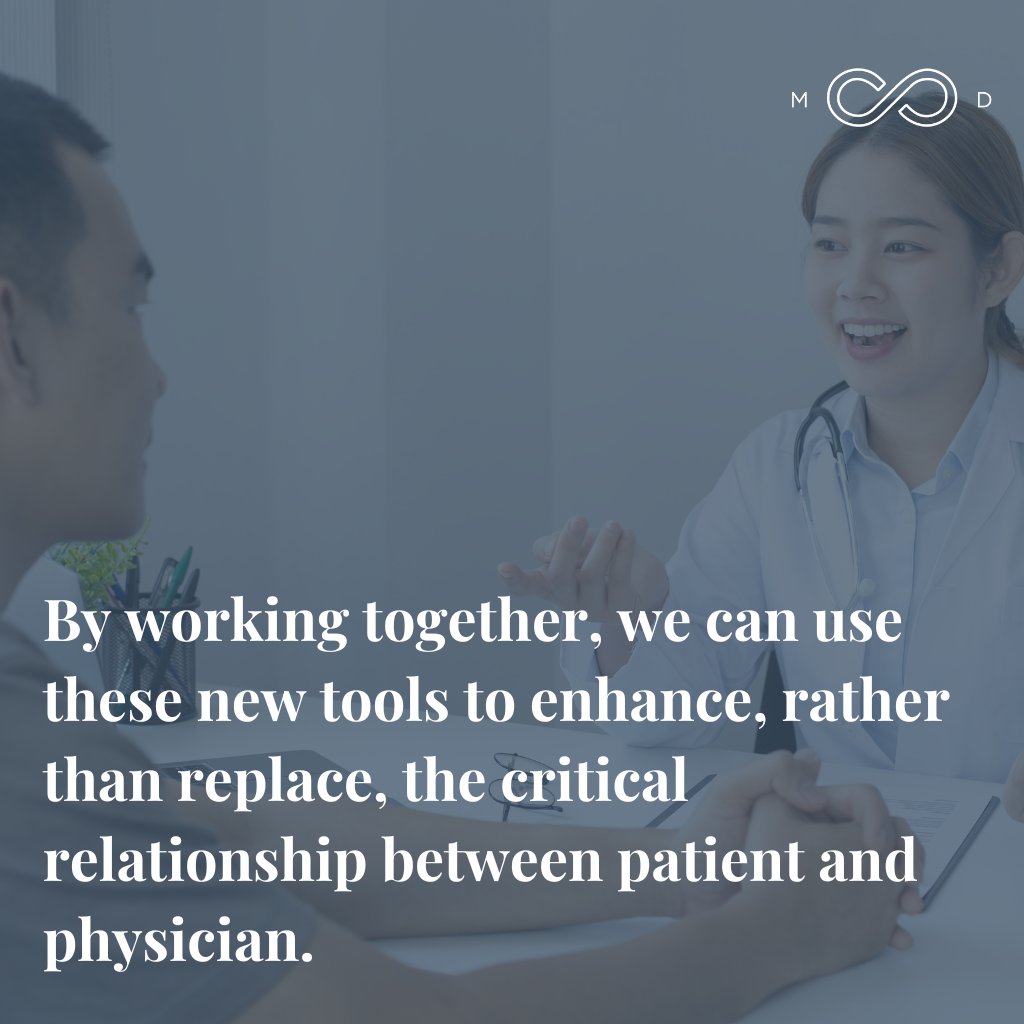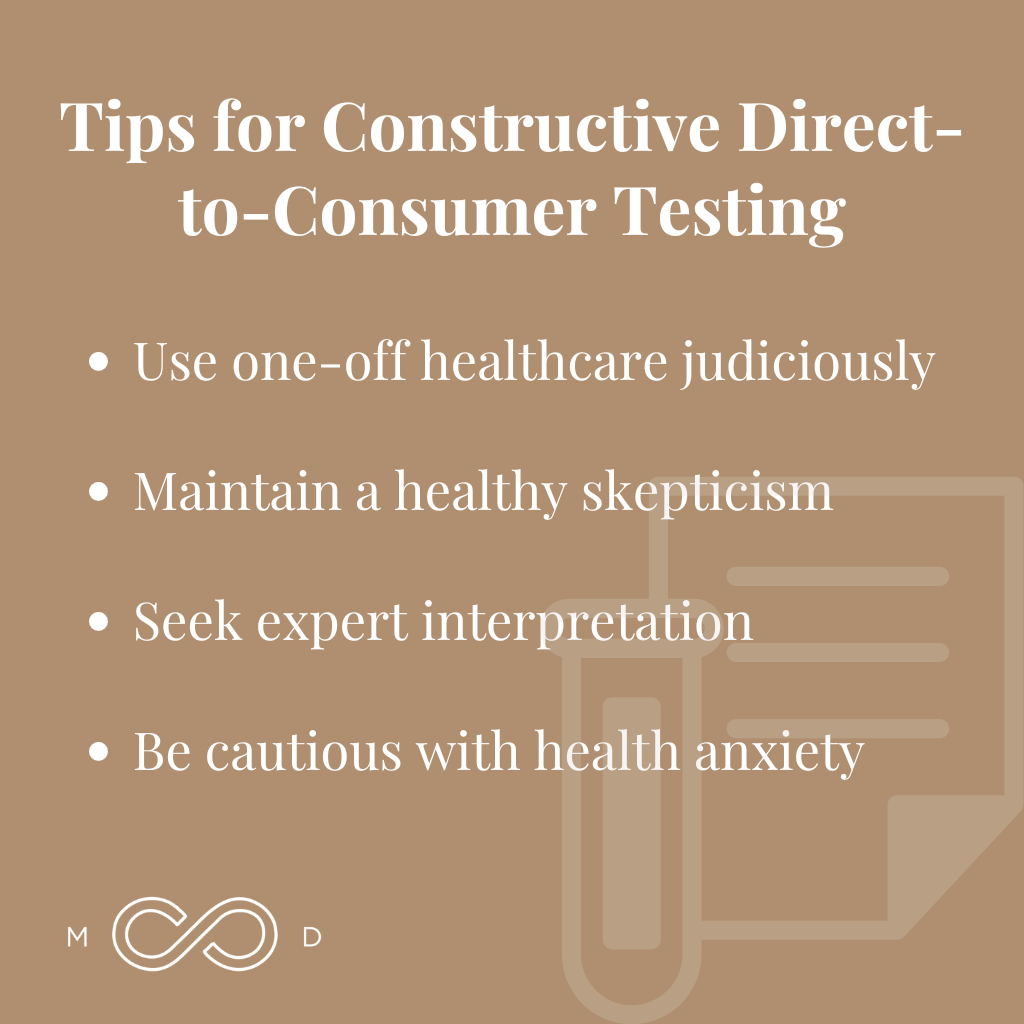Ten years ago, I’d rarely — if ever — have a patient directly ask me about getting a particular test or screening done. For nearly all of medical history, in fact, patients relied on their doctors to initiate and steer such conversations.
But today, the landscape has changed. Every day, patients bring up tests they’ve learned about from advertisements, online articles, or the shelves of their local Target. And they want to know if these direct-to-consumer labs hold any potential benefit for them.
I’m delighted for patients to take an active role in starting conversations about their health. It’s an empowering development, and it isn’t going anywhere anytime soon.
Of course, as with any new development, direct-to-consumer labs come with certain risks and precautions. My goal here is to discuss both the benefits and risks of direct-to-consumer labs at large so that you can make the most informed decisions for your ongoing medical care.
The Rise of Direct-to-Consumer Labs
How did this shift — which allows individuals to order lab tests, obtain prescription medications, and access diagnostics without the need for an in-person doctor’s visit — arise?
Television commercials, marketing efforts on podcasts and YouTube, and social media influencers aren’t the only drivers behind this shift, though they do play a major role. Two other factors have made the proliferation of direct-to-consumer healthcare possible:
- Advancements in technology, particularly video calls and messaging platforms facilitating telemedicine
- Relaxed guidelines around telemedicine, initially prompted by the COVID-19 pandemic
While perhaps not groundbreaking on the surface, it laid the foundation for this new paradigm.
Benefits of Direct-to-Consumer Labs
Direct-to-consumer testing can provide patients with additional data that influences their medical decisions and facilitates more proactive healthcare management. We in the medical community would be foolish not to consider the potential benefits of the many tests and diagnostics now available.
One of the biggest challenges, however, is the sheer number of new offerings. With more hitting the shelves (or the internet) every week, there’s simply no way for us to keep up with all of them.
As such, appointments in which we take the time to listen to our patients are crucial. They may bring up a test we’ve never heard of, and we need the openness and bandwidth to consider that test and whether it makes sense in the circumstance.
This is one of the many reasons I’m so thankful to have transitioned into concierge medicine. In the traditional model of healthcare, we typically take care of thousands of patients each year, with very little time allotted for each. In the concierge model, I have the opportunity to serve a few hundred patients each year, really listening to them, spending time with them, and getting to know each as an individual.
All this extra bandwidth translates, of course, into more personalized care. And, in the case of direct-to-consumer labs, it means more time to investigate new opportunities and assess them in the context of each individual’s health needs.
Risks of Direct-to-Consumer Labs
On the other hand, more information doesn’t always equal more knowledge. Without some aspect of personalization, I’m afraid direct-to-consumer lab tests may cause more confusion and anxiety than benefit.
What do I mean by that? Let me explain.
Lab tests are notoriously difficult to interpret, both because of the medical jargon and technicalities associated with them and because of the context needed for accurate analysis and actionable responses. Often, direct-to-consumer companies provide some type of commentary on results in their reports, but that commentary isn’t in context. It’s generic, based on population health and not on the overall picture of your health.
For instance, even with simple metrics like cholesterol or triglycerides or blood sugar levels, each reading gets reported in isolation. Typically, a paragraph may accompany each reading based on the company’s interpretation guide, which will be the same for every person with a similar reading on that one metric.
The major flaw here is that the testing system, even if using AI, can’t look at each individual diagnostic result and form an interpretation based on the full context. Health is complicated and full of interdependence. Insulin and A1C levels may influence triglycerides and cholesterol rather than forming completely separate results. In that case, the action you take to address one may also affect the other.
The interpretations lab companies provide are the same across thousands of people with similar results. I’m not saying, however, that the data these companies provide is useless. Just that it needs a more personalized interpretation in order to be actionable and useful for you.
This is where patients need a healthcare provider with whom they share a positive, robust relationship. As the point person for your care, they can incorporate new data into the overall picture of you, identifying and discussing with you which action items might be most appropriate in response.
Tips for Constructive Direct-to-Consumer Testing
If you find it consistently easier to obtain labs or have quick telemedicine visits with online providers than to contact your primary care physician, it might be time to reevaluate your relationship with your doctor. At Brentwood MD, we always preach about the importance of finding your team — one that shares and supports your health goals.
If you’ve found your team, then keep in mind these few guidelines as you approach direct-to-consumer lab tests:
- Use one-off healthcare judiciously: While convenient, piecing together your healthcare on your own from various direct-to-consumer services can lead to a complicated, redundant, and potentially very expensive DIY approach.
- Maintain a healthy skepticism: Be cautious of companies that sell both the diagnostic test and the treatment. While not necessarily dishonest, it’s worth investigating whether a mismatch in priorities might affect the recommendations you receive.
- Seek expert interpretation: While direct-to-consumer labs can provide great information and awareness, consolidating, synthesizing, and creating an action plan based on the results still depends on expert interpretation.
- Be cautious with health anxiety: If you struggle with health anxiety, be careful about navigating the world of direct-to-consumer testing alone. The pursuit of reassurance through more and more tests can sometimes lead to increased anxiety. Talk with a trusted doctor about which labs could truly benefit you.
The Role of Primary Care Alongside Direct-to-Consumer Labs
Direct-to-consumer healthcare isn’t going away, and in many ways, it’s a positive development. It provides access to more health information and empowers patients to engage more deeply with their own care.
As healthcare providers, we’re still adapting to this changing landscape. In my experience, I’ve seen my role to look like the following:
- Listen actively: Keep my finger on the pulse of what my patients are interested in and concerned about.
- Understand the underlying motivations: Are patients looking for reassurance? Answers to unresolved issues? Understanding these motivations helps me provide better recommendations and care.
- Guide and interpret: Help patients interpret results in the context of their personal health, not just population health guidelines.
- Provide support: Be ready to support patients who choose to use these services, helping them navigate the wealth of information they’re accessing.
The rise of direct-to-consumer healthcare presents both opportunities and challenges. As a physician, I see my role as helping patients harness the empowering aspects of this trend while guiding them away from potential pitfalls.
By working together, we can use these new tools to enhance, rather than replace, the critical relationship between patient and physician.


Dr. Wright joined Brentwood MD in 2022 as the model allows him to spend more time connecting with patients and build a foundation of exceptional care. He is a Nashville native and completed his family medicine residency at the University of Tennessee Health Science Center, where he also served as Chief Resident. He believes that your health deserves a prominent position on your priority list, and would be honored to serve you and your family.








